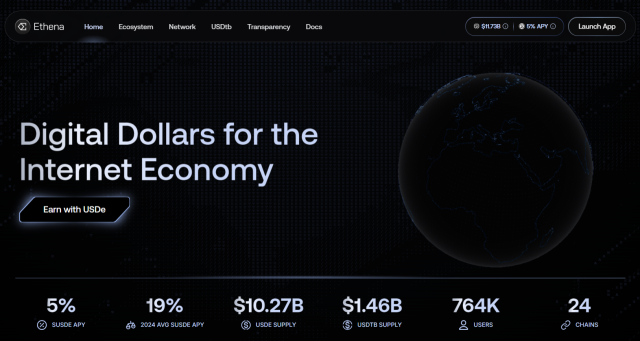
After the passage of the U.S. stablecoin regulation bill 'GENIUS Act', the issuance of interest-paying stablecoins has rapidly increased. This is due to the current regulation only prohibiting direct interest payments by stablecoin issuers backed by legal tender, leaving crypto-asset-backed stablecoins in a regulatory blind spot. The bill includes additional research provisions related to this, raising the possibility of future legislative supplementation.
According to CoinMarketCap at 2:50 PM on the 11th, the market capitalization of USDe, an interest-paying stablecoin issued by the DeFi protocol Ethena, is $1.027 billion (approximately 1.4258 trillion won), which has surged by about 89.5% since the passage of the GENIUS Act on July 18th. It ranks third among stablecoins after Tether (USDT) and USDC. This is a record achieved within 500 days of its launch last February, with a faster growth rate than USDT and USDC.
Related Articles
- Dunamu Subsidiary Lambda256 Enters Stablecoin Business
- Ripple-SEC Lawsuit Ends... Stablecoin Expansion Accelerates [Do Ye-ri's DeFi Radar]
- Lee Kwang-jae "Build K Platform as Won Stablecoin Payment Method"
- [Exclusive] No. 2 at U.S. Stablecoin Company 'Circle' Visits Korea... Discusses Policy and Cooperation
USDe is a stablecoin pegged to a value of one dollar, collateralized by other cryptocurrencies such as Ethereum (ETH). Unlike USDT and USDC, which maintain value through a 1:1 collateral structure with U.S. dollars, deposits, and short-term government bonds, USDe stabilizes its price by operating a short position betting on the price drop of the same scale as the collateral assets.
The popularity factor of USDe is its high interest income. When users deposit USDe in the Ethena protocol, they automatically receive sUSDe tokens. These tokens are designed to increase in value by reflecting the returns from the collateral assets. When converting the appreciated sUSDe back to USDe later, users can obtain interest income in addition to the principal. According to Ethena, the annual percentage yield (APY) of sUSDe is 5% as of this date.
The GENIUS Act passed last month prohibits interest payments by stablecoin issuers backed by legal tender. However, crypto-asset-backed and DeFi-based structures like USDe are excluded from regulatory targets.
Chris Perkins, CEO of Coinfund, said, "As the GENIUS Act prevents stablecoins from paying interest to users, stablecoins have become assets with declining value, and holders naturally turn to DeFi to find returns" and "If stablecoins worth trillions of dollars flow into CeFi as predicted by the U.S. Treasury, we will see a super-sized version of DeFi summer where users pursue maximum returns through various yield strategies."
Seemingly aware of regulatory risks, Guy Young, founder of Ethena, recently posted on X, "USDe is a 'synthetic dollar' with a structure different from fiat-based stablecoins" and "We have added a new notice to the user interface (UI) to ensure users confirm understanding these differences before using the app and are looking for ways to make this clearer."
There are also cases of circumventing regulations by separating stablecoin issuers and interest payment entities. PayPal is paying a 4% annual interest on its stablecoin PYUSD. In this case, the interest is provided as a reward through its Venmo app, not by the PYUSD issuer Paxos. Coinbase, a shareholder of Circle (USDC issuer), is also offering an annual rate to USDC holders by not being the direct issuer. After the passage of the GENIUS Act, the market capitalization of PYUSD and USDC increased by 3% and 21%, respectively.
However, as the U.S. government is aware of these regulatory gray areas, the possibility of future legislative supplementation is raised. Article 14 of the GENIUS Act mandates the U.S. Treasury to conduct research on stablecoins that do not fall under the definition of payment stablecoins in the law. Lee Hae-bung, head of the Upbit Investor Protection Center, explained, "This can be interpreted as a task to study whether crypto-asset-backed stablecoins and DeFi protocols can be incorporated into the institutional framework."
- Reporter Kim Jung-woo
< Copyright ⓒ Decenter, reproduction and redistribution prohibited >







